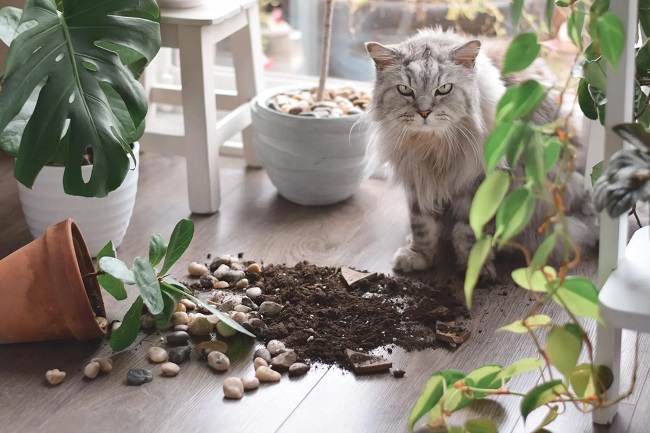Living harmoniously with our feline friends can be a challenge, especially when they intrude upon our private space. Whether it’s stray cats marking their territory or the neighbor’s cat exploring your garden, keeping cats away from your house can be a delicate matter.
This article provides practical, effective, and humane strategies to deter cats from your property while promoting peaceful coexistence.

Natural Deterrents for Cats
Citrus Peels: Cats dislike the smell of citrus. Scatter citrus peels (lemon, orange, or grapefruit) around your yard as a safe, natural deterrent.
Read Also:
Essential Oils: Certain essential oils, like lavender, peppermint, and eucalyptus, can deter cats. Dilute these oils with water and spray them around your property. Remember, these oils must be used sparingly as they can be harmful to cats in high concentrations.
Vinegar: Spraying a vinegar solution around your garden can also deter cats. However, avoid spraying directly on plants to prevent damage.
Landscape Modifications to Discourage Cats
Chicken Wire: Lay chicken wire on top of the soil or mulch in your garden beds. Cats dislike the feel of the wire under their paws and will likely move elsewhere.
Plant Cat-Repelling Plants: Certain plants, like Coleus canina (Scaredy Cat Plant), rue, or lavender, naturally repel cats. Incorporating these into your landscape design can keep cats away.
Use Rough Surfaces: Cats prefer soft, loose soil. Using surfaces like pebbles or stone mulch can discourage cats from walking or digging in your garden.
Commercial Cat Repellents
Ultrasonic Devices: These devices emit high-frequency sounds undetectable to humans but unpleasant for cats, effectively deterring them from your property.
Commercial Sprays: Various commercial cat repellent sprays are available on the market. Choose one that is non-toxic and safe for all animals and plants.
Improving Neighborhood Cat Management
Consider speaking with your neighbors about the issue. If the intruding cats belong to them, they might be willing to take steps to keep their pets confined.
In the case of stray cats, contact local animal control or feline rescue organizations that can provide humane solutions.
Installing Physical Barriers
Physical barriers can be a very effective method to deter cats. Here are some options:
Fencing: While cats are skilled climbers, certain types of fencing can make it challenging for them. Cat-proof fencing or roller bars at the top of existing fences can prevent cats from gaining access to your yard.
Netting: If you have specific garden areas you want to protect, consider installing netting around or over those areas. This can be particularly effective for protecting vegetable gardens or fish ponds.
Making Your Property Less Appealing to Cats
You can also take steps to make your property less appealing to feline visitors:
Remove Food and Water Sources: Ensure that all potential food sources, such as pet food or open trash cans, are securely covered or kept indoors. Similarly, remove any water sources, like open water bowls or birdbaths.
Clean Up Regularly: Regular cleaning can prevent cats from marking their territory. Cats are less likely to return to areas that don’t smell like them, so promptly cleaning up any waste or territorial markers can discourage return visits.
Dealing with Frequent Intruders
If a particular cat continually visits your property, you may need to take further action:
Microchip Scanning: If you can safely catch the cat, take it to a vet or a local animal shelter to have it scanned for a microchip. This could help identify the cat’s owner, allowing you to address the problem directly.
Humane Trapping: If the cat appears to be a stray, consider humane trapping. Once trapped, the cat can be taken to a local animal shelter. Always check local regulations before trapping a cat.
Teaching Your Pets to Deter Cats
If you have a dog, it can be trained to safely chase cats away without harming them. This method requires careful training and constant supervision to ensure no harm comes to the cat.
If your dog is not cat-aggressive and responds well to training, this can be a natural and effective way to keep cats out of your yard.
Read Also:
Conclusion
While it can be frustrating when cats intrude on your property, it’s important to remember that cats are curious by nature. All deterrent methods used should be safe and humane.
Through a combination of natural deterrents, landscape modifications, and commercial repellents, you can successfully keep cats away from your house while ensuring their well-being.
Ultimately, fostering communication within your community and promoting responsible pet ownership can help maintain harmony between humans and our feline friends.
























